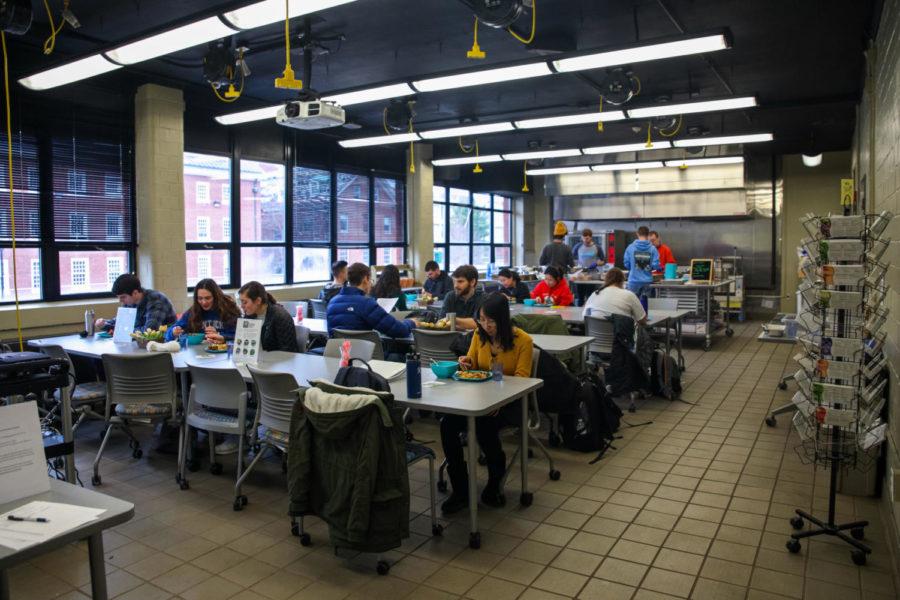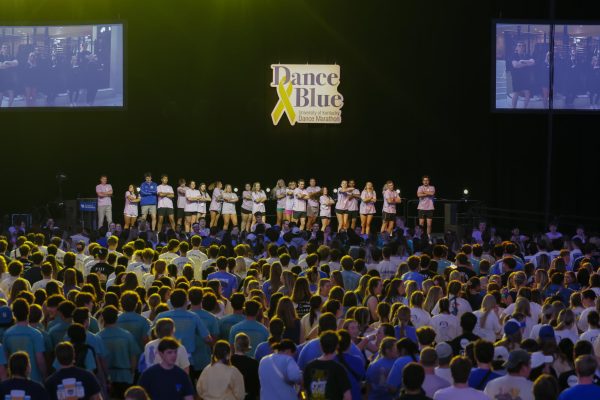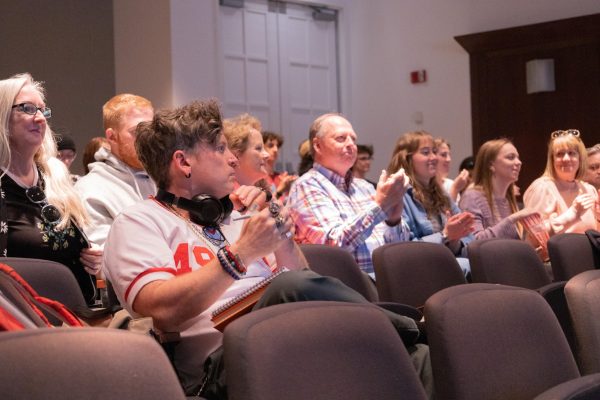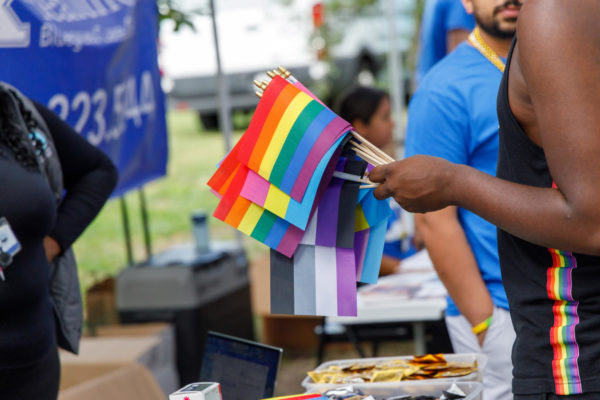Not just a free lunch: UK student org focuses on education, community
January 29, 2020
An old adage says “there’s no such thing as a free lunch”, but that’s exactly what’s offered by Farm-to-Fork, an on-campus organization that aims to reduce food insecurity at UK.
Farm-to-Fork serves one free meal a week, on Wednesdays from 11 a.m. to 1 p.m. in Funkhouser 207. The meal is open to students, faculty and staff.
The organization began in the fall of 2018 as an offshoot of Campus Kitchen, a hunger relief organization operating out of the Department of Dietetics and Human Nutrition, said Celia Ritter.
Ritter graduated from UK in May of 2019 and now works for Campus Kitchen as a food justice manager through AmeriCorps. She helps Farm-to-Fork plan meals and do surveys and research.
Farm-to-Fork itself is volunteer-driven, said Julia Garner. Garner, a human nutrition major, started as a volunteer and now serves as co-coordinator of Farm-to-Fork.
“A lot of volunteers start out eating lunch at Farm-to-Fork and then after they learn about what Campus Kitchen is doing, what Farm-to-Fork is doing, they love what our goals and missions are and start volunteering,” said Kendra Oo, faculty adviser for Campus Kitchen.
Volunteers not only cook meals, but also help collect the food used in the meals. The Farm-to-Fork model is built on food recovery. Every week, volunteers collect unused food from restaurants, grocery stores and campus dining.
Places like Whole Foods and Panera are big sources, said Ritter.
The meal on any given week is determined by what Farm-to-Fork recovers. Ritter said they only buy foods they can’t recover – pantry staples, like baking soda, seasoning and eggs.
“We usually like to have a meat option and a vegetarian option, we really try to work with dairy-free, gluten-free, all that,” said Garner.
The average cost per person per meal is less than 40 cents, said Oo.
Oo was a founding member of Campus Kitchen as a student in 2014. As Director of Community Outreach for the Department of Dietetics and Human Nutrition, Oo also teaches nutrition classes.
Nutrition is a big focus for Farm-to Fork.
Ritter said that convenience is often a barrier to food security because much of the free and inexpensive food on campus is not sustainable – things like pizza, donuts and fast food.
Farm-to-Fork tries to fill this gap by providing healthy meals.
“We try to use a lot of fresh produce – stuff that it’s going to be more difficult for students to keep in their apartment or dorm room,” said Ritter.
Oo said Farm-to-Fork has served over 1,200 unique individuals from 70 different majors.
“The first Farm-to-Fork they thought there was only going to be about 25 students and 75 showed up,” said Ritter. “It seems like we’re kind of leveling off at around 150 just because it’s a small space and we don’t have the capacity to cook that much more.”
Molly Atamanuik, a senior, said she ate at Farm-to-Fork almost every week last semester.
She heard about Farm-to-Fork through her major, human nutrition, and said that having class in the same building as Farm-to-Fork made it easy to stop by for lunch.
“Wednesdays for some reason are always my busy days every semester, so it really saves me from trying to pack a lunch or trying to figure out where I want to go on campus and wait in lines and all that,” said Atamanuik. “I think that could be the same for other students – it takes the stress of off one meal a week they know that they get.”
Ritter said Farm-to-Fork came about after the Food Access survey done on UK’s campus, reported that 43 percent of UK students are food insecure in some capacity.
“I think for a while, on campus hunger wasn’t something that was talked about or understood very well, but over the past 10 years or so people are recognizing it’s an issue,” said Ritter.
In the last couple of years, UK has seen students push for increased food security and many student organizations dedicated to that cause. Among those organizations, Farm-to-Fork is unique because of its focus on education.
“When we looked at the framework of food security and dived deeper, we understand that you have to do knowledge and behavioral change before you can establish food security sustainably,” said Oo.
“We recognize that we’re not going to solve food insecurity by serving one meal a week,” said Ritter. But by providing students with information on nutrition and food resources, Farm-to-Fork can help students sustain themselves in the long run.
To that end, Farm-to-Fork includes handouts at every meal and educational activities on different topics.
Ritter said last semester, topics included healthy recipes you can make on a budget, meal planning for the college student, the benefits of meatless meals and food waste.
Another thing that makes Farm-to-Fork unique is the community aspect.
“I feel like everybody’s so friendly,” said Atamanuik. “If there’s an open seat between two people they don’t mind, you can sit there and eat with them. I did commonly eat with friends, but I met new people too.”
Garner said it was a safe space, and that students will line up outside of Farm to Fork before lunch opens just to hang out.
“There’s nothing that makes you feel out of place or bad that you’re getting this meal,” said Garner. “It’s just a free meal and you’re meeting your friends for lunch.”
Additionally, more than half of the people who come to Farm-to-Fork heard about it through a personal network, said Oo, citing a survey conducted by Campus Kitchen.
“We can tell that they are told by friends and that they come together with friends and they eat together with friends or they make friends, so instead of having your earbud and eating by yourself, it’s more of that community aspect,” said Oo.
Ritter and Oo emphasized that Farm-to-Fork is open to everyone – no questions asked.
“Our main goal is to help every student out. When you look at the Farm-to-Fork handout, it says ‘no time, no lunch, no worry.’ That’s how we want to phrase it, not like ‘are you struggling to make ends meet?’,” said Oo.
This mindset is important, said Oo, because food insecurity is affected by more than just income.
“Obviously, there’s a strong correlation, but that’s not the only correlation and that’s not the only cause. And when people think like that, they feel stigmatized,” said Oo.
Students can be food insecure because they struggle to balance school, social life and money, or because of other barriers: transportation, time or simply not knowing how to cook – or not having cooking utensils, said Oo.
Oo was a student founding member of Campus Kitchen in 2014; her master’s thesis was on college food insecurity and the barriers students face.
“The main thing that they mentioned is often student employment, or fellowship, stipend, that kind of thing,” said Oo.
As a response to that need, almost half of the funding for Farm-to-Fork went to student fellowship.
“We listened to what students need and created positions, so students get paid for the work they are doing and not just volunteering,” said Oo.
The second challenge is free meals, said Oo, and this is where Farm-to-Fork fits in. Besides the meal offered on Wednesdays, Farm to Fork helps students locate other resources like food pantries.
Oo, Ritter and Garner agreed that students are surprised to find Farm to Fork.
“We’ve been getting graduate students coming over, and they’re like ‘this is a hidden gem. we had no idea this was here,’” said Garner.
Ritter said that the biggest meal of last semester was Thanksgiving, which served 168 people. Farm-to-Fork will likely not expand the Wednesday meal because of space limitations, said Ritter.
“I can see expanding to more days or more hours more than I could see expanding the Wednesday meal,” said Ritter.
























































































































































